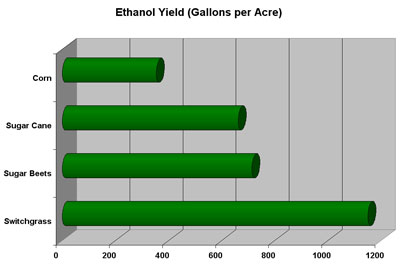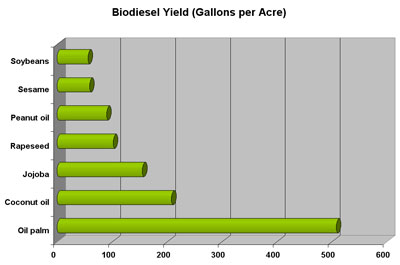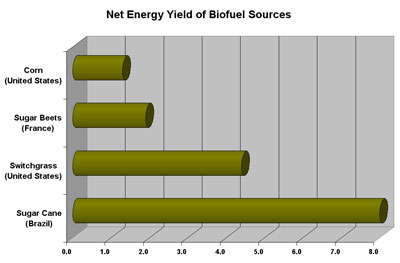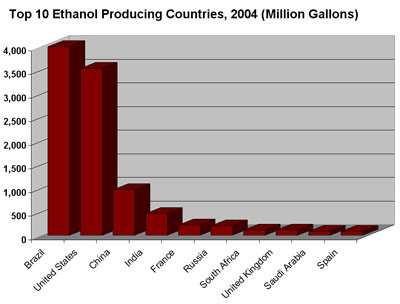Ethanol may be greener but have higher health cost
Ethanol may be greener but have higher health cost
Rhett A. Butler, mongabay.com
April 18, 2007
Widespread burning of ethanol as fuel may increase the number of respiratory-related deaths and hospitalizations relative to gasoline, according to a new study by Stanford University atmospheric scientist Mark Z. Jacobson. The report comes as mounting environmental concerns cloud the benefits of using ethanol as a “green” alternative to fossil fuels.
“Ethanol is being promoted as a clean and renewable fuel that will reduce global warming and air pollution,” said Jacobson, associate professor of civil and environmental engineering. “But our results show that a high blend of ethanol poses an equal or greater risk to public health than gasoline, which already causes significant health damage.”
The new research, published in the April 18 online edition of the journal Environmental Science & Technology (ES&T), is based on computer modeling to simulate air quality in the year 2020, when ethanol-fueled vehicles are projected to be widely available in the United States.
“The chemicals that come out of a tailpipe are affected by a variety of factors, including chemical reactions, temperatures, sunlight, clouds, wind and precipitation,” he explained. “In addition, overall health effects depend on exposure to these airborne chemicals, which varies from region to region. Ours is the first ethanol study that takes into account population distribution and the complex environmental interactions.”

|
Jacobson found that while E85 vehicles reduce atmospheric levels of two carcinogens, benzene and butadiene, they increase two others—formaldehyde and acetaldehyde.
“As a result, cancer rates for E85 are likely to be similar to those for gasoline,” he said. “However, in some parts of the country, E85 significantly increased ozone, a prime ingredient of smog.”
Smog is known to reduce lung capacity, worsen asthma and impair the immune system according to the U.S. EPA. The World Health Organization estimates that 800,000 people die each year due to smog.
“In our study, E85 increased ozone-related mortalities in the United States by about 200 deaths per year compared to gasoline, with about 120 of those deaths occurring in Los Angeles,” Jacobson said. “These mortality rates represent an increase of about 4 percent in the U.S. and 9 percent in Los Angeles above the projected ozone-related death rates for gasoline-fueled vehicles in 2020.”
Jacobson said the health effects of E85 will be the same, whether the ethanol is made from corn, switchgrass or sugar cane.
“Today, there is a lot of investment in ethanol,” he said. “But we found that using E85 will cause at least as much health damage as gasoline, which already causes about 10,000 U.S. premature deaths annually from ozone and particulate matter. The question is, if we’re not getting any health benefits, then why continue to promote ethanol and other biofuels?
Jacobson said there are cleaner, safer alternatives available today.
“There are alternatives, such as battery-electric, plug-in-hybrid and hydrogen-fuel cell vehicles, whose energy can be derived from wind or solar power,” he said. “These vehicles produce virtually no toxic emissions or greenhouse gases and cause very little disruption to the land—unlike ethanol made from corn or switchgrass, which will require millions of acres of farmland to mass-produce. It would seem prudent, therefore, to address climate, health and energy with technologies that have known benefits.”
Some environmentalists argue that corn-based ethanol and other energy crops like soybeans and oil palm are depleting water supplies and, in the tropics, putting biodiverse rainforests at risk. There are widespread concerns that demand for biofuels are causing food prices to rise.



Charts showing Net Energy Yield, Ethanol Yield (Gallons per Acre), and Biodiesel Yield (Gallons per Acre) for Coconut oil, Corn, Jojoba, Oil palm, Peanut oil, Rapeseed, Sesame, Soybeans, Sugar Beets, Sugar Cane, and Switchgrass.

Charts showing top 10 producers of ethanl in 2004. In decending order, the top producing companies are Brazil, United States, China, India, France, Russia, South Africa, United Kingdom, Saudi Arabia, and Spain
Related:
Palm oil doesn’t have to be bad for the environment — 4/4/2007
As traditionally practiced in southeast Asia, oil palm cultivation is responsible for widespread deforestation that reduces biodiversity, degrades important ecological services, worsens climate change, and traps workers in inequitable conditions sometimes analogous to slavery. This doesn’t have to be the case. Following examples set forth by the Roundtable on Sustainable Palm Oil and firms like Golden Hope Plantations Berhad, a Malaysian palm oil producer, oil palm can be cultivated in a manner that helps mitigate climate change, preserves biodiversity, and brings economic opportunities to desperately poor rural populations.
U.S. can cut oil imports to zero by 2040, use to zero by 2050 — 3/29/2007
The United States could dramatically cut oil usage over the next 20-30 years at low to no net cost, said Amory B. Lovins, cofounder and CEO of the Colorado-based Rocky Mountain Institute, speaking at Stanford University Wednesday night for a week-long evening series of lectures sponsored by Mineral Acquisition Partners, Inc.
Biofuels demand will increase, not decrease, world food supplies — 3/27/2007
As concerns mount over fuel-versus-food competition for crops, a Michigan State University ethanol expert says that cellulosic ethanol could render the debate moot. Bruce Dale, an MSU chemical engineering and materials science professor, notes that ethanol can be made from cellulosic materials, like farm waste, instead of corn grain.
Bush, U.S. automakers look for easy way out of fuel standards — 3/26/2007
President Bush praised U.S. automakers on their efforts to build more ‘flexible fuel’ vehicles capable of running on blends of gasoline and biofuels like ethanol and biodiesel. Environments retorted that the announcement was simply a ploy to undermine efforts to develop more fuel efficient cars, according to The Associated Press.